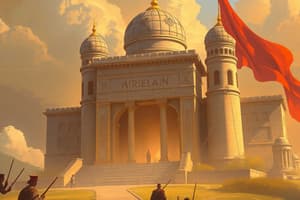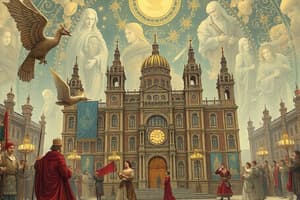Podcast
Questions and Answers
What is the definition of autocracy?
What is the definition of autocracy?
- Rule by a single individual (correct)
- Rule by elected representatives
- Rule by the people
- Rule by an elite group
Which of the following are examples of dictatorship?
Which of the following are examples of dictatorship?
- North Korea (correct)
- Canada
- China (correct)
- Switzerland
Theocracy is ruled by religious leaders.
Theocracy is ruled by religious leaders.
True (A)
What is meant by anarchy?
What is meant by anarchy?
What is a feature of a parliamentary system?
What is a feature of a parliamentary system?
In a representative democracy, power comes from the people who choose their leaders.
In a representative democracy, power comes from the people who choose their leaders.
What is a key characteristic of direct democracy?
What is a key characteristic of direct democracy?
What does socialism aim to do?
What does socialism aim to do?
What defines an oligarchy?
What defines an oligarchy?
What distinguishes aristocracy?
What distinguishes aristocracy?
Flashcards are hidden until you start studying
Study Notes
Autocracy
- Rule by one individual, known as the autocrat, who holds all power and makes unilateral decisions.
- Absence of laws or a constitution that limit the autocrat's authority.
- Citizens lack democratic processes, such as elections, to express their preferences.
- Advantages include rapid decision-making; however, individual rights are often overlooked and power may be enforced through coercion.
- Some autocracies are theocratic, linking authority to divine right.
Dictatorship
- Characterized by one individual, the dictator, possessing absolute control over governance.
- Dictators tend to disregard human rights and operate without accountability to the public.
- A dictatorship lacks governmental responsibility to the citizens; policies and actions are unregulated.
- Often categorized as autocracies or oligarchies.
- Notable examples include North Korea and China.
Theocracy
- A government led by religious figures, where legal and governing authority aligns with religious laws.
- Leaders often viewed as divinely guided, with clergy members serving in political roles.
- Historically prevalent in early civilizations; diminished in the West during the Enlightenment.
- Modern examples include Saudi Arabia, Iran, and the Vatican.
Anarchy
- Represents the complete absence of governing authority and law.
- Results in a state of nature where individuals fend for themselves without organized structure.
- Individuals must manage resources, such as farming and shelter-building, independently.
- No formal systems for governance, laws, or voting exist.
Parliamentary System
- Operated by a prime minister, with executive powers held by a cabinet accountable to the legislature.
- Combines democratic governance, with executive authority stemming from parliamentary support.
- Typically different individuals serve as head of state and head of government.
Representative Democracy
- A political system where power originates from the populace who elect leaders to create and implement laws.
- Also known as indirect democracy or representative republic, contrasting with direct democracy.
Direct Democracy
- A governance style where citizens vote directly on issues rather than through elected representatives.
- Currently does not exist at the national level; feasible mainly in small communities with limited governance issues.
Utopian Communism
- Details are lacking in the provided text, but generally refers to an idealized society in which property is communally owned, aimed at eliminating class distinctions.
Socialism
- Focuses on regulating private interests to benefit the public good.
- Predominantly practiced in democratic contexts, especially in Europe.
Oligarchy
- Governance by a small elite group, often based on wealth or social status.
- Elite members may be elected, inherit their position, or require a certain wealth or landownership to gain council status.
- Decision-making occurs through periodic gatherings to address significant issues and appoint officials for enforcement.
Aristocracy
- Ruled by a socially superior hereditary class, as theorized by Plato and Aristotle.
- Defined as governance by the few perceived as morally and intellectually superior, aiming to benefit the larger population.
Studying That Suits You
Use AI to generate personalized quizzes and flashcards to suit your learning preferences.




